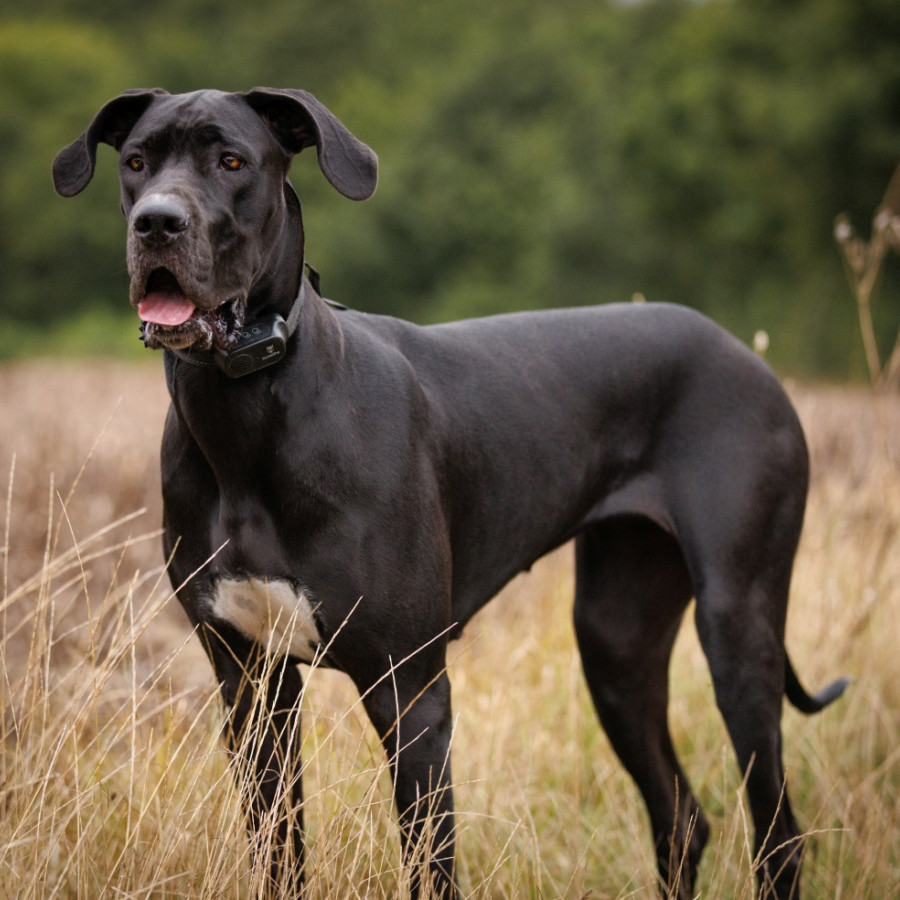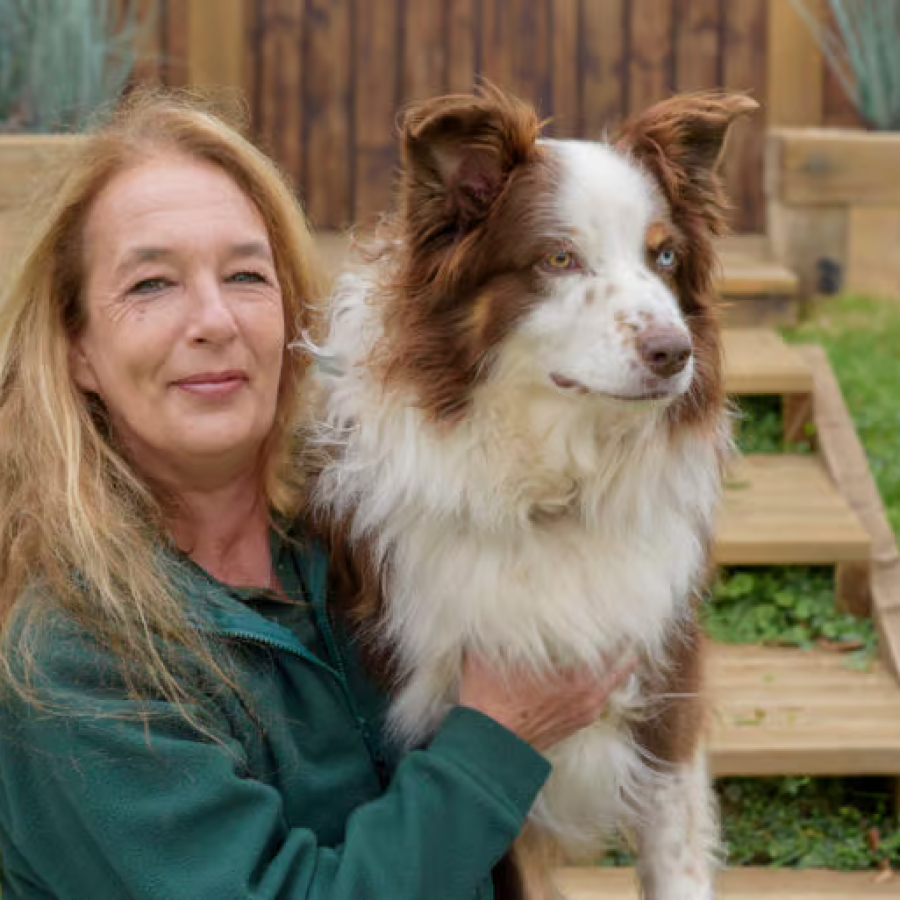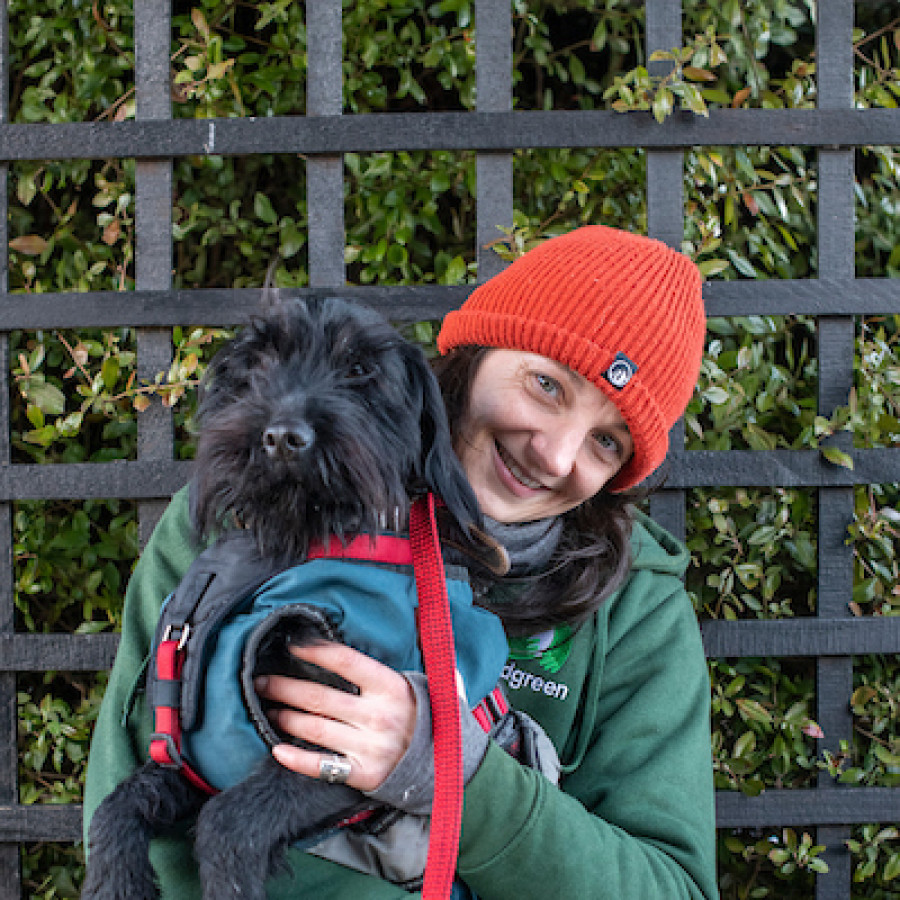
Great Dane Dog Breed
The Great Dane is a gentle giant! This big breed is sensitive, affectionate and needs space to spread out!

The Great Dane is a gentle giant! This big breed is sensitive, affectionate and needs space to spread out!
The Great Dane is a giant breed with a gentle heart. Originally bred as hunting and guard dogs, they’re now known for being affectionate companions. Despite their size, they can be easily spooked if not socialised properly. They require plenty of space, exercise, and companionship to thrive.
Great Dane size varies between males and females. Males typically stand around 76–86 cm tall at the shoulder and can weigh up to 90 kg, while females are slightly smaller but still impressively tall and strong.
Great Dane temperament is affectionate and gentle, and they form a strong bond with their families. Despite their imposing stature, they are typically friendly and good-natured and make excellent companions. They thrive on human interaction and dislike being left alone for long periods so need an owner with a lifestyle to match.
These dogs have a moderate energy level and enjoy daily walks, but they’re also happy to lounge around the house with you.
Great Danes were originally bred to be large game hunting dogs and guard dogs. This means they need early socialisation to be calm, comfortable, and confident with visitors and strangers. Their prey drive needs to be considered if they’re around small animals. Great Danes traits such as loyalty, confidence, and patience make them wonderful family companions, and they can be good with children and other pets, but early socialisation is essential to ensure they grow into well-mannered adults.
Disclaimer
While these breed traits give a general idea of what to expect from a specific type of dog, it's important to remember that every dog is unique. Just like people, each dog comes with their own distinct personality, quirks, and characteristics!

Great Danes can make fantastic family dogs when properly socialized and trained consistently. They are affectionate and protective of their family members. However, due to their sheer size, interactions with small children should always be supervised as they could accidentally seriously injure a child.
Although Great Danes are not inherently aggressive, their natural guarding instincts make them excellent watchdogs. They are typically friendly with familiar visitors but can be reserved around strangers due to their history as guard dogs. Early socialisation and training will go a long way, especially when combined with a visitor protocol that ensures everyone feels comfortable. Due to their size, they can easily intimidate visitors, so be sure to give new guests a heads up on your gentle giant’s dimensions.
Families considering a Great Dane should be prepared for their demanding companionship needs, as they don’t tolerate being left alone for long periods.
Great Danes are incredibly affectionate and love being close to their humans. They are known for leaning on their favourite people as a sign of affection, often unaware of their slightly ungainly size! Although some are more reserved, most Danes enjoy snuggles and being near their family members.
They are emotionally sensitive and form deep bonds with those they trust. Whilst they may not be overly needy, they do best in a home where they receive plenty of love and attention.
Great Danes can be quite playful, especially as puppies. They enjoy interactive games such as fetch, tug and light-hearted playing in the garden. However, their size and energy levels need careful management to prevent injuries, especially during their rapid growth phases.
As they mature they tend to become calmer but still appreciate playtime with their family. Engaging them in structured play and training exercises is essential to keeping them mentally and physically fulfilled.
Great Danes are not excessively vocal, but they will bark to alert their family to potential threats. Their deep, booming bark makes them an effective deterrent to intruders.
They are generally quiet indoors but may bark when excited or seeking attention. Proper training can help prevent nuisance barking, especially in younger dogs.
Due to their large size and strength, early training and socialization is crucial. Without proper training, Great Danes can develop disruptive behaviours like pulling on the lead or jumping up on people. These are seemingly minor issues for smaller breeds but are much more problematic for Dane-sized dogs.
Great Danes are prone to separation related issues. If left alone for long periods they may exhibit destructive behaviours like excessive barking, chewing furniture, or escape attempts. Gradual desensitisation to being alone, and mental stimulation, can minimise these issues.
These sensitive dogs can develop fear-based behaviours unless properly socialised. A lack of exposure to different people, places, and experiences during puppyhood can lead to timidity, fear aggression, or excessive shyness. Due to their guarding background, they can also show territorial behaviours if not properly socialized/trained.
Great Danes have been used historically for hunting, so care must be taken around smaller animals.
Great Danes need a home with enough space to accommodate their large size. They are best suited to houses with fenced gardens rather than small apartments. Sometimes having a Great Dane, or a dog of similar size, requires a complete lifestyle change. You need a car big enough to transport them and a house large enough to ensure they have several resting spots and can comfortably move around.
They thrive in homes where they are not left alone for long periods, as they’re prone to separation related issues.
Due to their drooling and shedding, they may not be ideal for particularly house-proud families.
Despite their size, Great Danes have moderate exercise needs. They require at least one to two daily walks or about one hour of physical exercise a day, along with playtime and mental stimulation.
However, because they are prone to joint issues, high-impact activities like excessive running or jumping should be avoided, especially when they are young.
Mental stimulation through training, puzzle toys, and scent work is also important to keep them engaged and prevent boredom.
Great Danes are at high risk of developing bloat, a potentially life-threatening condition that requires urgent medical attention. They should never be exercised (at minimum) one hour before or after eating a meal.
Great Danes are intelligent and moderately easy to train. Although they learn quickly, you need to be consistent, patient, and ready to provide plenty of positive reinforcement for them to be successful.
Training Challenges
They can be easily distracted, especially as puppies but it’s crucial to do socialisation and lead training early on, as their size makes them trickier to control in later years! Be gentle with Great Danes, harsh training methods can make them fearful or resistant to learning.
Use positive reinforcement, such as treats, play and praise, as well as keeping training sessions short and engaging to hold their focus!
Watch out for common challenging behaviours like; jumping up on people, pulling on the lead, separation anxiety, fearful behaviours due to poor socialisation, and destructive chewing due to boredom.
Training should continue into adulthood, as behaviour issues can resurface throughout life.
Great Danes have a short coat that requires minimal grooming. Weekly brushing helps control shedding and keeps their coat healthy. Bathing is needed only occasionally, unless they get particularly dirty.
Regular ear cleaning, nail trimming, and dental care are important for their overall health. Given their size, grooming can be a bit of a challenge, so early exposure to handling is essential.
Great Danes are prone to certain health issues, which can usually be managed with proper care. Common conditions include:
• Hip dysplasia
• Osteoarthritis
• Entropion
• Ear infections
• Cancer
• Bloat or Gastric Torsion.
• Dilated Cardiomyopathy
• Wobbler Syndrome: A spinal issue causing coordination problems
• Hypothyroidism
A good diet is crucial. Investing in a diet specific to large breeds when your Great Dane is young can help to prevent some issues later down the line. Certain nutritional problems during growth can result in rapid growth of limbs, joint swelling, pain, and other issues. It’s important then to be aware of any physical changes in the dog’s appearance or gait, especially while they’re still growing.
Due to their size, Great Danes do not have a very long lifespan. On average their life span is anywhere between 7-12 years old.
I am a Great Dane, and don’t have excessive exercise needs, but I do need daily playtime, walks, and regular movement to keep my joints and muscles strong.
I’m intelligent and need activities that challenge me, like puzzle toys, obedience training, and interactive play. Keeping my mind busy helps prevent boredom and destructive behaviour.
I am a big, strong dog, so I need early training to learn good manners. Teaching me lead skills and polite greetings will make life easier for both of us.
Owning a Great Dane can be expensive. Initial costs for a puppy from a breeder range from £1,500 to £2,500.
Monthly costs for food, vet care, and insurance can range from £200 to £300 due to the large size and dietary needs of Great Danes.
Medical expenses can be high, especially for common health issues in giant breeds.
The Great Dane life span is generally between 8 and 10 years and maintaining a healthy diet and regular vet checks can help support a longer, happier life.
Take our quiz to discover which breed is right for you
Take our quizPlease call our pet support line on 0300 303 9333 (7 days a week – 8.30am - 4pm)
